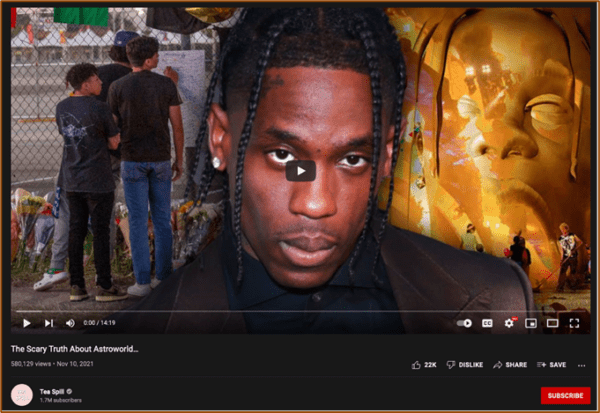
On November 5-6, 2021, rapper Travis Scott was scheduled to hold his annual Astroworld music festival in his hometown of Houston, Texas. Though it has been running since 2018, Astroworld 2020 was cancelled due to COVID-19, so many fans were eager to attend the festival in 2021. Sadly, 10 people were killed and hundreds more were injured on the first night after attendees rushed the stage when Scott came out to perform, suffocating and stampeding over people within the densely packed crowd (Patel & Kasakove, 2021). While Scott’s shows are infamously known for the “mob mentality” among the audience, this disaster became one of the deadliest concerts in history (Patel & Kasakove, 2021). Naturally, the horrifying news of Astroworld 2021 found a place on the front pages of newspapers and TV stations continually updating viewers on the investigation into the attendees’ deaths and injuries. However other, more unlikely, sources picked this story up as well: YouTube “tea” channels.
Similar to celebrity gossip TV channels like E! News or Access Hollywood, tea channels on YouTube are primarily entertainment outlets that aim to cover the drama-filled lives of influencers on the Internet. For example, scandals involving makeup artists like James Charles and Jeffree Star are common. Moreover, as influencers themselves have become more prominent across the Internet (and in our society writ large), so too has this genre of content become more and more popular on YouTube, garnering millions of views from audiences around the world. Drama channels like Spill and Tea Spill discussed Astroworld 2021 in their respective video formats, while commentary channels like H3 covered it in a podcast episode that was later uploaded to YouTube. Why did these tea channels decide to pick up this event when it would not normally fall into their content range, and what are the implications of doing so?
On one hand, some find it ethically questionable that tea channels decided to cover something as serious as the Astroworld incident, especially since Scott is a musician rather than an influencer. While he could have been included in the genre due to his relationship with Kylie Jenner (who has been the subject of numerous videos on drama channels) or to comment on the ways different (micro-)celebrities responded to the event on social media, it is nonetheless odd for channels that usually divulge influencer “tea” and/or “beef” to discuss a deadly tragedy that seems more fit for professional journalists. Indeed, doing so could be viewed as likening a mass causality event to run-of-the-mill entertainment gossip.
Moreover, these tea channels may be (perhaps unintentionally) spreading misinformation and conspiracy theories. Pointing to “evidence” such as the stage’s design resembling “a portal to hell,” users across social media (especially on TikTok) have argued that the deaths from Astroworld 2021 were not accidents but planned as part of a “satanic ritual sacrifice” (Palma, 2021). Indeed, Weill writes that “Footage of Scott’s performance has been used to support a far-right movement that is already deeply embroiled in Satanic Panic conspiracy theories like QAnon, which falsely accuses Donald Trump’s foes of participating in a Satanic pedophilia and cannibalism ring” (Weill, 2021). While mainstream news outlets –including Forbes, Vice, and The Guardian, among others– specifically referred to demonic speculation as conspiracy theories, YouTube tea channels like Tea Spill were more likely to just report on such claims in their videos without taking any extra steps to debunk them.
On the other hand, some have argued that it is perfectly acceptable for tea channels to cover Astroworld 2021, so long as they do so respectfully. When such a major event happens, it is natural for people from different walks of life –and different media bubbles– to want to talk about it. Importantly, as Rebecca Haddad notes, there are contemporary pressures for social media users (especially those with large platforms) to speak up about important events. She writes: “There’s this idea among some that if you’re not posting to social media… you’re turning a blind eye to those who are suffering” (Haddad, 2021). In this sense, it is possible that some tea channels might have even felt obligated to cover a topic that does not fit their usual content.
Furthermore, when discussing tea channels on YouTube, it is crucial to consider the concept of metrics. Metrics can be anything measurable indicator (likes, views, hits, follows, etc.) accepted by others that demonstrates one’s apparent reach or effectiveness. Metrics play a massive role in drama creators’ careers on YouTube, not only in providing economic revenue (and thereby creating career opportunities for creators), but also in establishing a hierarchy within the community (Christin & Lewis, 2021). This could explain why some tea channels periodically include stories that are more mainstream and are not necessarily about influencers. For example, many drama creators extensively covered Britney Spears’ conservatorship case, even though Spears (like Scott) is a musician, not an influencer.
In the end, it is unclear whether the decision of YouTube tea channels to comment on a fatal tragedy like Astroworld 2021 alongside their normal fare of influencer gossip is ethically problematic. While most drama creators tried to “do their own research” and did not intentionally try to use false information, their inclusion of conspiracy theories without debunking them may have unintentionally aided their spread. Of course, YouTubers are not journalists and do not abide by any official or shared guidelines. Ethically speaking, however, what happens when tea channels on social media begin to function like mainstream journalism in covering vital news stories of the day?
Discussion Questions:
- What values are in conflict when drama channels cover more serious and tragic events?
- What are the differences between tea channel content creators and journalists?
- What advantages do tea channel commentators have over professional journalists? What limitations might they—and their content—have?
- Do you think drama channel audiences will begin using these channels as a source for news if they begin covering more mainstream stories? Why or why not?
- What ethical principles should a drama channel creator follow if they want to cover more serious news content like the Astroworld tragedy?
Further Information:
Christin, A., & Lewis, R. (2021). “The drama of metrics: Status, spectacle, and resistance among YouTube drama creators.” Social Media+ Society, 7(1), 2056305121999660. Available at: https://doi.org/10.1177/2056305121999660
Dellatto, M. (2021, November 9). “No, the Astroworld Tragedy Was Not a Satanic Ritual.” Forbes. Available at: https://www.forbes.com/sites/marisadellatto/2021/11/09/no-the-astroworld-tragedy-was-not-a-satanic-ritual/?sh=46f4825a4393
H3 Podcast. (2021, November 8). “Travis Scott & Astroworld – H3TV #15.” YouTube Video. Available at: https://www.youtube.com/watch?v=IUzPQS-S9jg
Haddad, R. (2021, November 8). “‘If You’re Not Posting About This Issue You’re on the Side of the Oppressor:’ Social Media and Performative Activism.” Her Campus. Available at: https://www.hercampus.com/school/uwindsor/if-youre-not-posting-about-this-issue-youre-on-the-side-of-the-oppressor-social-media-and-performative-activism/
Lamoureux, M. (2021, November 8). “People Seriously Think Astroworld Deaths Were a Travis Scott Satanic Ritual.” Vice. Available at: https://www.vice.com/en/article/epxdxk/astroworld-travis-scott-conspiracy-theory-satanic-panic
Palma, B. (2021, November 8). “No, the Astroworld Tragedy Wasn’t the Result of ‘Satanic Rituals.’” Snopes. Available at: https://www.snopes.com/news/2021/11/08/astroworld-travis-scott-satanic-ritual/
Patel, V., & Kasakove, S. (2021, November 7). “What to know about the Houston Astroworld tragedy.” The New York Times. Available at: https://www.nytimes.com/article/astroworld-festival-what-to-know.html?searchResultPosition=6
Paul, K. (2021, November 9). “Astroworld disaster fuels wave of satanic conspiracy theories on TikTok.” The Guardian. Available at: https://www.theguardian.com/us-news/2021/nov/09/astroworld-disaster-fuels-wave-of-satanic-conspiracy-theories-on-tiktok
Spill. (2021, November 20). “Travis Scott Astroworld tragedy gets much worse. And it wasn’t the first time.” YouTube Video. Available at: https://www.youtube.com/watch?v=aoO29l-r7TA
Tea Spill. (2021, November 10). “The Scary Truth About Astroworld…” YouTube Video. Available at: https://www.youtube.com/watch?v=kUEzrXFNjDI
Weill, K. (2021, November 8). “TikTok and QAnon Panic Over ‘Satanism’ Conspiracies at Deadly Travis Scott Concert.” Daily Beast. Available at: https://www.thedailybeast.com/travis-scott-astroworld-concert-sends-tiktok-and-qanon-into-satanic-panic-conspiracies
Authors:
Claire Coburn, Kat Williams, & Scott R. Stroud, Ph.D.
Media Ethics Initiative
Center for Media Engagement
University of Texas at Austin
October 18, 2022
Image: Screenshot from Tea Spill on YouTube
This case was supported by funding from the John S. and James L. Knight Foundation. It can be used in unmodified PDF form in classroom or educational settings. For use in publications such as textbooks, readers, and other works, please contact the Center for Media Engagement.
Ethics Case Study © 2022 by Center for Media Engagement is licensed under CC BY-NC-SA 4.0




